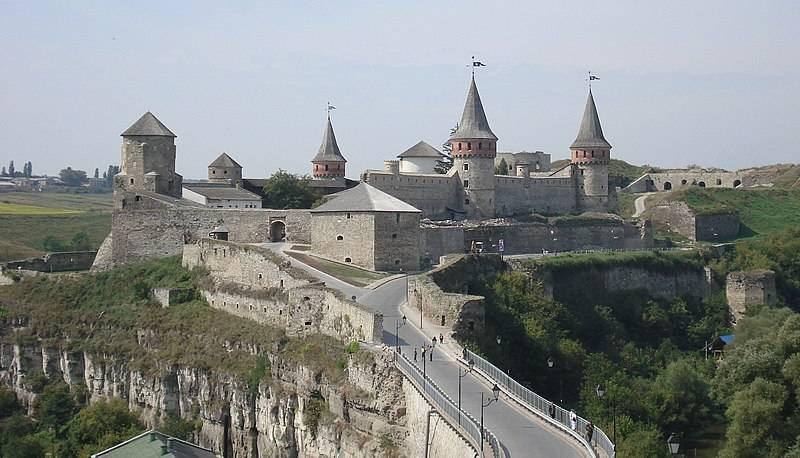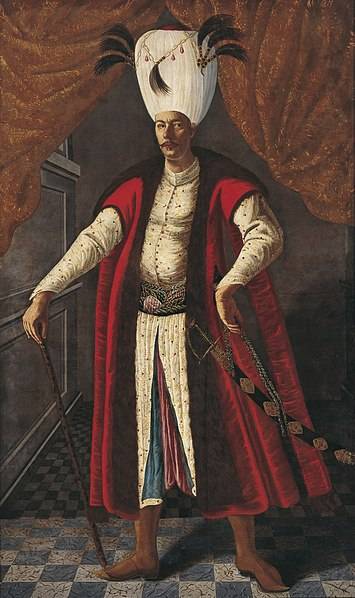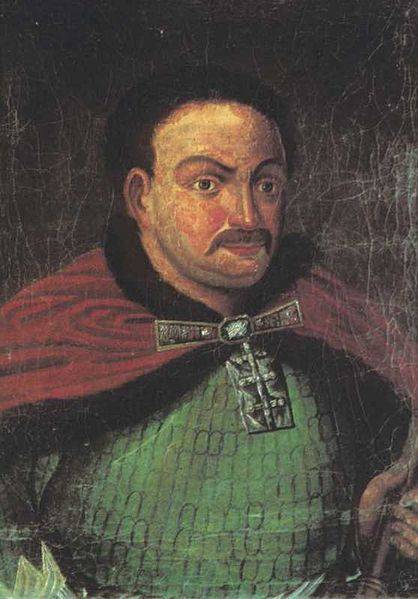Turkey turns north and crushes the Poles

Kamyanets-Podolsk fortress
Under Turkish rule
The Hetmanate retained internal autonomy, freedom from Turkish taxes and pledged to help the Sultan with its army.
For himself personally, Doroshenko bargained for irremovability from the hetman dignity and inheritance in his family. The pro-Turkish position aroused the anger of many ordinary Cossacks. Some of them came under the rule of the new hetman of the Left Bank Mnogogreshny, others - under the banners of the Zaporozhye ataman Sukhovei (Sukhoveenko) of Uman Colonel Khanenko. Mikhail Khanenko was recognized as the hetman of a part of the Right-Bank Ukraine (three westernmost regiments). And he recognized the power of Poland.
Doroshenko, with the help of the Turks, repelled the attack of Khanenko and Sukhovey (he was supported by the Crimeans). Sultan Mehmed IV made Selim-Girey the Crimean khan, who was a loyal vassal of the Port and coordinated all his actions with Constantinople. Selim entered into an alliance with Doroshenko, the Cossacks and Crimeans for the third time attacked Western Ukraine, subject to Poland.
The Polish gentry, as usual, was in no hurry to mount horses and take up sabers. Only the Khanenko Cossacks fought desperately against the enemy. But Hetman Khanenko received unexpected help from the Zaporozhye koshevoy Ivan Sirko (Serko).
This was a legendary person. Born in the Kharkov region, in a family of suburban Cossacks, then went to the Sich. He showed unique military talents and, according to legends, had “special”, “wonderful” qualities. The Turks were afraid of him and called him "Urus-shaitan" ("Russian devil"). And they frightened children with his name. At the same time, Sirko himself was distinguished by his rare generosity, disinterestedness and nobility, a real Zaporozhye "knight". He did not beat a weak enemy, did not take anything from the booty, was teetotal, which was rare for a Cossack. He became famous as a zealous defender of the Russian faith. He fought with the Turks and Crimeans, for the freedom of Western Russia (Ukraine) with Khmelnitsky.
However, being already Vinnitsa colonels, he refused to take the oath to the Russian Tsar and returned to Zaporozhye. Sirko defended the traditions of the Sich on principle, reviving the independent "Lytsar brotherhood". They were drawn to him as a noble and honest man, Cossacks flocked, tired of the split, betrayal and strife of hetmans and colonels. He did not accept the partition of Ukraine when it was revealed that Doroshenko had surrendered to the Turks. Severed relations with him.
Sirko ravaged the enemy's rear. This distracted the Crimeans. The Polish crown hetman Sobieski defeated the enemy in the battle of Bratslov (August 1671) and Kalnik (October 1671). This gave Turkey a reason to intervene in the war.
The sultan demanded that the king not attack
demanded to withdraw the troops, threatening to start a war.
Turkish invasion
The Poles were alarmed.
Another embassy went to Moscow to ask for an alliance. The question was difficult. Turkey was a threat to both Christian powers. However, Warsaw was a dubious ally.
In Moscow, they remembered how the pans behaved during the Russian-Swedish war, set the Crimean horde against them, how they violated agreements when it was profitable. Now Poland was begging for help. And at the same time, the pans persecuted the Orthodox. Many had to flee.
Also, the Poles offered Russia to let the Jesuits into the country, to allow the construction of Catholic churches. The Russian side of the Jesuits and churches immediately rejected. They agreed with the need for an anti-Turkish union, but in return they offered Poland to recognize Russia's power over Kiev. They dodged concrete plans and promised help from the detachments of the Don Cossacks, Kalmyks and Nogai.
Moscow tried to resolve the conflict through diplomatic means. An embassy was sent to Istanbul, the sultans offered to join the peace treaty between Russia and the Polish-Lithuanian Commonwealth. The Russian sovereign Alexei Mikhailovich warned Porto that in the event of an attack by the Turks on Poland, we would help her. The Grand Vizier arrogantly demanded that the Russians stay away from "Polish affairs."
Russia refused from annual gifts to the Crimean Khan, the Crimean ambassadors were exiled to Vologda. Preparations for war began.
Moscow tried to find allies in Western Europe. Alexei Mikhailovich's embassies went to England, France, Sweden, Spain, Austria and Rome. It was proposed to jointly oppose
However, the Western countries had no time for Turkey.
The Ottomans are far away. There are problems that are closer and more important. The Austrians were recently defeated by the Turks and did not want to fight yet. Pope Clement responded, but only with the aim of persuading Moscow to "cooperate", to revive the projects of the union. As a result, no allies were found.
The war in Constantinople had already been decided. At the end of 1671, Hetman Doroshenko received strong reinforcements from the Tatars and Turks. And he launched a counteroffensive. Then Sultan Mohammed sent a sharp reprimand to the Poles for disturbing the property
Doroshenko.
The Polish king tried to justify himself, wrote that Ukraine
and Doroshenko is his subject.
Turkey started the war. In the spring of 1672, a huge Ottoman army moved across the Danube - 100-150 thousand people. The troops were led by the sultan himself and the grand vizier Fazil Ahmed Pasha. Poland was able to put forward only a small detachment of Luzhetsky (several thousand soldiers) to meet. On the Southern Bug, he patted the enemy's forward detachments, and then retreated to Ladyzhin, to the Khanenko Cossacks. The Turks besieged them. And the main forces flowed along the West Russian roads.

Sultan of the Ottoman Empire, who ruled 1648–1687, Mehmed IV.
New quarrel in Ukraine
And on the Left Bank a new quarrel was started.
Hetman Much-sinful, when the Ottoman Empire entered the war, he began to think, is it time to again spread to the camp of Doroshenko?
Other representatives of the Cossack foreman dreamed of a hetman mace. And as soon as the Many-sinful was set up, he was immediately surrendered to Moscow. The general clerk Mokrievich, the troop wagon train Zabello, judges Domontovich and Samoilovich, the Pereyaslavsky, Nezhinsky and Starodub colonels told the tsarist governors that the hetman was getting down with Doroshenko and agreed to recognize the power of the Port. The governors did not hesitate. The sinful man was deposed and sent to Moscow.
The Boyar Duma sentenced him to death, but the Emperor pardoned him and sent him into exile in Siberia. There he still served Russia well, fought with the Mongols, led the successful defense of the Selenginsky prison. Before his death he was tonsured.
The foreman, having got rid of the Many-sinful, grappled with each other. The struggle for the place of the hetman, intrigue, squabbles and lies. Sirko arrived in the hetman capital, Baturin, to find out which candidate to support the Cossacks. However, he was too popular with ordinary Cossacks. His glory was feared. Atman was slandered that he was an enemy of the king, that he was serving the Poles.
Sirko was arrested, taken to Moscow and sent into exile in Tobolsk. But they quickly came to their senses that such commanders were needed in the war with the Turks, and returned to Ukraine.
The main contender for the place of the hetman was considered the second man in the army, an experienced intriguer Mokrievich. He took over the local control system. But with the support of the tsarist governors Romodanovsky and Rzhevsky, on June 17, 1672, at the parliament in Konotop, the general judge Ivan Samoilovich was elected hetman.
This was the first hetman of the Left Bank since the time of Bogdan Khmelnitsky, who remained loyal to Moscow, although he had previously supported Bryukhovetsky's rebellion.

Hetman of the Left Bank Ivan Samoilovich (1672-1687)
The defeat of Poland and the Buchach peace
Meanwhile, the war in Ukraine continued.
The Polish king Mikhail Vishnevetsky (he was elected with great difficulty in 1669) tried to raise an army. However, he had a strong opposition among the magnates, the great crown hetman Sobieski opposed him, the gentry disrupted the Seimas. A civil war was brewing.
Moscow hoped that Poland would still mobilize and repulse the threat of a Turkish invasion. The Turks will get bogged down in the siege of fortresses. At this time, Russia will distract the enemy by attacking Azov and Crimea. However, the Ottomans did not get bogged down.
The Polish lords hoped for a strong fortress Kamyanets-Podilsky -
The city was prepared for the siege. But the garrison was small - 1,5 thousand people under the command of Potocki.
On August 12, 1671, the Turks reached the fortress and soon began active hostilities. The fortress lasted only until the end of the month. Pototsky surrendered Kamenets. Churches were turned into mosques, cemeteries were destroyed. That is, the Turks were going to make the city Muslim. There was no one to stop the Sultan's army further. Almost without resistance, the Ottomans continued their victorious movement. The Turks besieged Buchach.
On September 28 they entered Lviv.
The king and the lords were in complete panic. There is no money, the army has not been raised. What if the enemy goes to Warsaw?
The Poles agreed to all the demands of the Ottomans. In October 1671, the Buchach Peace Treaty was signed. Poland recognized Doroshenko as a subject of Turkey. The Polish throne renounced the Podolsk and Bratslav voivodeships, the southern part of the Kiev voivodeship was withdrawn by Doroshenko. Podillia and Kamenets were directly part of the Turkish Empire as Kamenets Pashalyk. Warsaw paid the Ottomans a reward for military spending and pledged to pay an annual tribute. The Turkish army withdrew for the winter across the Danube.
To Azov and Crimea
Back in the spring of 1672, the tsarist government instructed the Don army, the Zaporizhzhya Sich and the Kalmyks of the Taishi Ayuki to organize campaigns on Azov and the Crimea. The Don Ataman Yakovlev was asked to attack the coast and ships of Turkey and the Crimean Khanate (previously this was strictly prohibited). The Kalmyk horde and the Astrakhan Tatars had to go to Kerch or Perekop and smash the Crimeans. The Cossacks along the Dnieper were ordered to go to the Black Sea and smash the enemy. A number of plows and gulls (ships), guns and ammunition were sent to the Zaporozhye Cossacks. In the spring, the Crimean horde sent the main forces to help the Sultan's army and Doroshenko, so the peninsula had weak protection.
It turned out to organize trips only in August.
On August 20, the Donets (about 5 thousand) came near Azov. At the end of August, the Cossacks attacked the watchtowers, which blocked the exit from the Don. The artillery smashed one tower to the bottom, the other half. Then they retreated. In October, we received a new tsarist order - to destroy the tower, but not to touch Azov.
Detachments of Kalmyks arrived to help the Donets. Cossacks and Kalmyks in October again went to Azov and ravaged its surroundings. The Kalmyks, after actions near Azov, raided Perekop and ruined a number of Crimean uluses. The Zaporozhian Cossacks decided to set out on land, as they had not prepared ships. 9 thousand detachment was led by ataman Vdovichenko. The Cossacks went to Perekop, but did not achieve anything, fell out and overthrew Vdovichenko. We returned to the Sich.
Thus, it was not possible to organize preventive campaigns in a timely manner and distract the enemy from Poland. However, the actions of the Cossacks worried Crimea and Turkey; in subsequent campaigns, part of their forces was diverted to the defense of these areas.
The successes of Turkey in the war with the Commonwealth have greatly alarmed Moscow.
Doroshenko was now exhibited as hetman of all Ukraine, behind him stood the powerful Porta. Information was received that the next enemy attack would fall on the Left Bank. That the Turks were proud of their easy victories over the Lyakhs and now wish to conquer the Russian state. The collection of an emergency tax for the war was announced.
The Poles secretly sent an embassy, offering the Russian sovereign to send an army to the Right Bank. They assured that Poland would immediately tear apart the Buchach peace, the Russians and Poles would lead an offensive on the Danube.
However, it was obvious that Warsaw wants to get out at the expense of Russia. Therefore, the war plan for 1673 was purely defensive. They decided not to hurt the Ottomans, but if they climbed, they would meet on the Dnieper. Also entice the Dnieper Cossacks to their side.
Romodanovsky's army marched into the Ukraine, united with Samoilovich's Cossacks. Sirko was returned from exile. Ataman returned to the Cossacks with a large ammunition train.
To be continued ...
Information